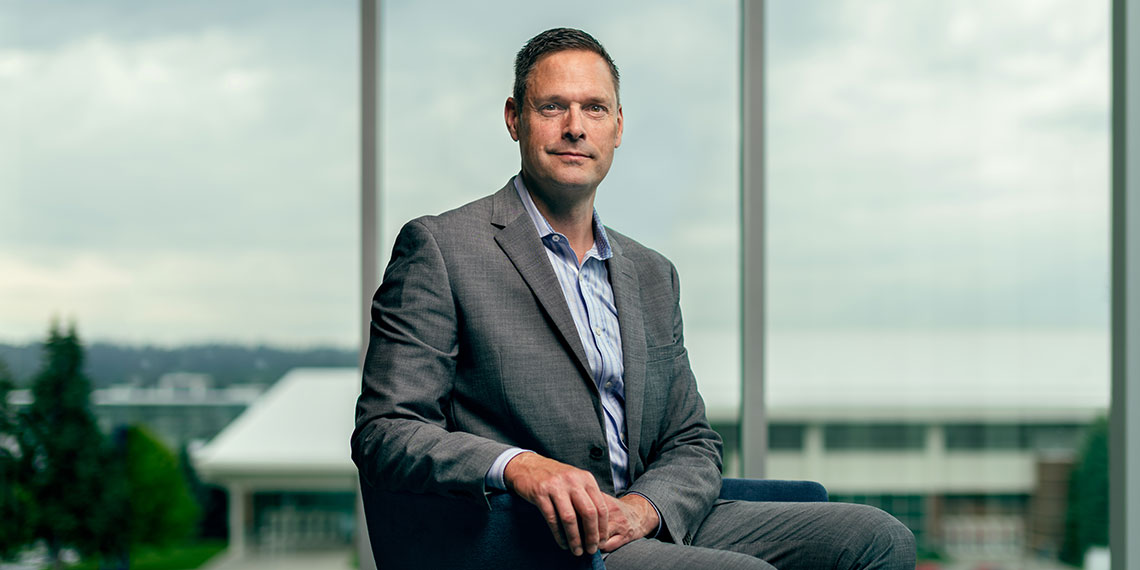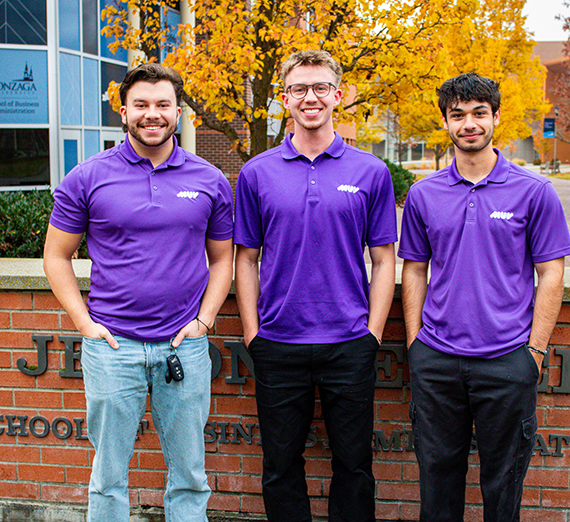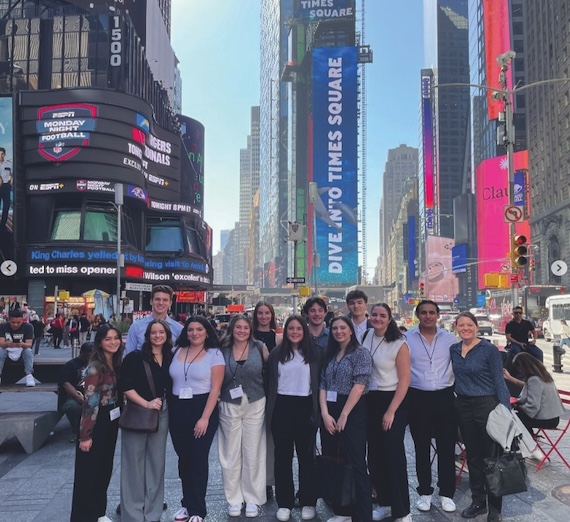Community-minded and Gonzaga Educated
For STCU CEO and President Ezra Eckhardt (MBA '02), community connections inform his life

One hears a lot about connections in the business world, typically in the context of making them to increase profits, or to help in a job search.
But what about the connections that link a person to a community, to an ethical approach to business, to the idea of serving others through your work?
Ezra Eckhardt (M.B.A., ’02), president and CEO of Spokane-based credit union STCU since 2018, is one person whose connections inform his life.
His connection to his Spokane hometown brought him home after years away attending West Point, serving around the world in the U.S. Army and then working in Seattle. His connection to the military informs his can-do attitude and skills as a communicator and leader. And his connection to the Jesuit ideals learned first at Gonzaga Prep and in Gonzaga University’s M.B.A. program fuels the work he does with STCU supporting the people of the Inland Northwest.
Case in point: STCU recently announced a five-year $100,000 gift to Gonzaga University, split among Opportunity Northeast and its Campus Kids and Essential Skills programs and the School of Education and its Office of a Pedagogy of Hope Through Research and Practice. STCU also recently launched the Here for Good Foundation, which committed $250,000 over five years to help the organization LaunchNW assure every student in the region has the opportunity to pursue post-high school education.
Eckhardt is quick to note that STCU has a team dedicated to finding community-based organizations to invest in, that these aren’t decisions just he makes. And, he adds, programs like Opportunity Northeast and LaunchNW “tie very specifically into some big picture things that we’re focusing on.” STCU’s emphasis on supporting educators and students has been clear since the credit union formed among a group of teachers at Spokane’s Lewis & Clark High School in 1934, and it remains an emphasis even as STCU has grown significantly beyond its humble beginnings.
“We were started by teachers and for teachers,” Eckhardt says. “We have a very important place in our heart to support education and early development and full, life-long development, so we absolutely want to stay committed to the education resources in our community."
"We want people to have access to knowledge so they can open up doors for themselves.”
Big Moves
Eckhardt can just look in the mirror to find someone who used education as a catalyst to a life that was perhaps unimaginable when he was growing up at the bottom of the Monroe Street hill near Dan’s Barbershop in North Spokane. The grade school across the street from his house was torn down while he was a student there, and his parents then enrolled him in Trinity Elementary School, which eventually led him to Gonzaga Prep.“I was proud of my nerdiness in high school,” Eckhardt says, focusing on his homework and joining the debate team. He was “terrible” at debate at first, he says, but was able to attend all the tournaments thanks to his mom volunteering to drive the team. He eventually excelled at debate as well as in the classroom, but he remembers that one of the most important lessons he learned was that his parents wouldn’t be able to pay for him to go to college. So, in addition to classroom studies and extracurricular activities, Eckhardt spent considerable time trying to figure out how to fund his higher education.
Enter West Point, the U.S. Army’s military academy in New York, where Eckhardt’s time as a cadet was the typical academy combination of physical training and heavy-duty classroom work. To say it was a bit of culture shock after growing up in Spokane would be an understatement.
“My parents put me on the airplane by myself and I flew to New York. Right when you landed they got you a hotel room, then they loaded you on a bus and up to West Point, and it was like ‘game on’ right when you got off the bus,” Eckhardt says. “The first year is terrible, but I definitely used the skills that I got in high school. I felt very well prepared, which I think speaks to the Jesuit education.”
The Long Way Home
Eckhardt served six years in the army after graduating from West Point, including stops in Rwanda, Bosnia and Liberia. But he always knew he wanted to make his way back to Washington, and he landed a job in Seattle with Honeywell. It proved a fortuitous turn for a couple of reasons. The job provided an intense introduction to business practices beyond the operations he’d learned in the military, and the company bought a big factory in Spokane which gave Eckhardt the chance to move home.Once back in eastern Washington, he explored M.B.A. programs before deciding on Gonzaga, and now says “the program was exactly what I needed.” It not only opened new opportunities for him at Honeywell, it gave him financial management experience to pair with his business operations experience.
“Pretty much every other job I had after that, I was really well prepared,” Eckhardt says of a career path that’s also included stops at Microsoft, Sterling Bank and Umpqua Bank before he got to STCU, in addition to stints on the boards for Spokane International Airport and the Spokane University District.
“From my observation, the program continues to get better and better. I think the faculty put a lot of emphasis on accreditation. I think the organization of the classes is great. And of all my experiences, the capstone class really gave me all the tools I needed for business strategy.”
Eckhardt is able to appreciate how both his military training and business training dovetailed nicely to make him effective as a leader at STCU. While navy and air force folks are trained to utilize massive pieces of very expensive equipment, army trainees like himself learn different, people-oriented skills.
“The biggest thing I was in charge of was a car, basically,” Eckhardt says. “Everything else was about how do you organize this 150-person group of people to do something. How you communicate, how you set objectives. How to improvise, adapt and overcome. Having a lot of flexibility in a situation and applying those leadership skills equipped me to be successful in the business world.”
Still Serving
After years working in the traditional banking industry, Eckhardt was thrilled to move into working at a not-for-profit credit union where “my focus wasn’t around paying shareholders dividends, it is around community service.” STCU is owned by its 270,000 members and “our shareholder dividend comes in the form of how we give back to the community.”
Reflecting on his time as a student at GU, Eckhardt says his primary takeaway was the importance of being a lifelong learner. The diversity of his classmates — in educational backgrounds, goals, age and experience — “created a learning experience for me that I hadn’t even expected coming into the program.” But despite their differences, he says, they all walk away with the shared emphasis on the Gonzaga mission to carry on in their lives.
“Woven into the education were some of the key Jesuit principles around being servant leaders and things that I know continue to be built out in the program,” he says. “The concepts of business ethics, and that it’s not all just about making money. Businesses need to make money, but you have to have an ethical foundation in how your business is contributing to some of the greater needs in society.”
- Alumni
- Academics
- Service & Community Impact
- School of Business Administration
- Business Administration




